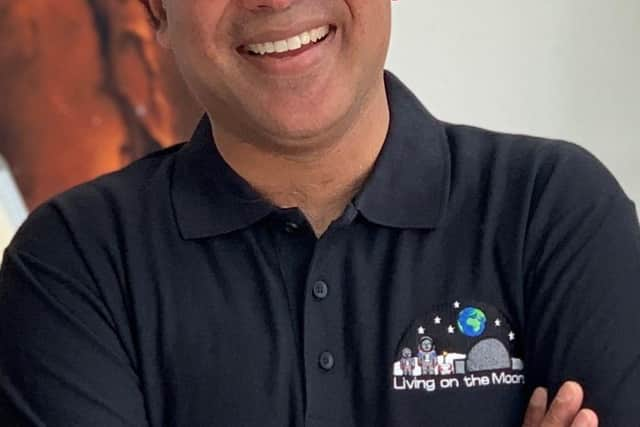Your chance to touch the Moon ... and find out how to live there


Now, those who attend the Royal Scottish Geographical Society’s (RSGS) upcoming talk in Galashiels will be able to actually touch it.
The story of exploration on the Moon has not ended. We are at another cross-roads of technological advancement and scientific knowledge – a new era of robotic space exploration – with the Moon at its centre – is upon us.
Advertisement
Hide AdAdvertisement
Hide AdTo unpack what this means, the RSGS is hosting an evening with Professor Mahesh Anand in Galashiels as part of the RSGS Inspiring People talks programme.


Professor Anand, who is an expert from the School of Physical Sciences at the Open University (OU), will discuss how the Moon is becoming a favourite target for established and emerging space-faring nations and commercial entities.
He’ll argue that this renaissance in lunar exploration is driven by an increased realisation that the Moon could be the perfect technological testbed for exploring more distant bodies such as Mars.
And he’ll describe how one vision of the future includes humans living on the Moon – the idea that one day a sustainable presence of humans will be based on the lunar surface, exploiting and utilising the Moon’s natural resources to support life 384,400 km from Earth.
Advertisement
Hide AdAdvertisement
Hide AdCommenting on the upcoming talk, Professor Anand said: “I am really looking forward to sharing the scientific knowledge derived from my research with the widest cross-section of the community.
“With my talk Living on the Moon I will describe the progress we have made over the past 50 years in Lunar Science, and discuss why the Moon is the ideal place for establishing longer-term human presence in order to explore the deeper parts of our solar system.
“In order to realise this ambition, humans will need to perfect the art of ‘living off the land’ which would also promote space exploration in a more responsible and sustainable manner.
“I hope that the audience will be inspired by realising that ‘space’ is for all – and everyone has a contribution to make. These talks will assume even greater significance because of Neil Armstrong’s ancestral link to Langholm in Scotland – and, of course, the RSGS.
Advertisement
Hide AdAdvertisement
Hide Ad“I plan to bring a Moon rock to the talk which the audience can handle,” he added, “which is particularly exciting as it is the largest lunar meteorite in the UK.”
Mike Robinson, Chief Executive of RSGS said: “Since our inception in 1884, the RSGS has been a strong promoter of research and exploration in space, as discoveries in space inform our understanding of the geographies that exist on Earth.
“Neil Armstrong has spoken for us, as have Piers Sellers, and Helen Sharman the first female British astronaut.
“To coincide with last year’s 50th Anniversary of the Moon Landings, we collaborated with the Open University to produce a magazine focussed on space, including insight from filmmakers, scientists and TV personalities – it’s wonderful, therefore, to continue this relationship with the OU and Professor Anand.“
Advertisement
Hide AdAdvertisement
Hide AdThis exciting evening of lunar adventure will be take place on Tuesday, February 25 in Galashiels, at Heriot-Watt University’s Scottish Borders Campus,
The talk begins at 7.30pm and tickets, £10, are available via rsgs.org or on the door.